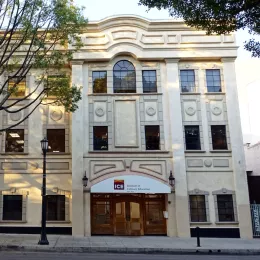ICE’s Culinary Management Instructors are seasoned industry professionals who have opened and operated their own restaurants and food businesses. They are still active in the industry, working on their own projects while teaching classes at ICE. Julia Heyer is a restaurant consultant and has worked on projects from Dubai to Mexico City. Vin McCann has managed restaurant operations ranging from $500,000 to $400 million in revenue. With such a wide range of experience between these two, we decided to ask these two to take a closer look at some of the trends and culinary businesses we keep hearing so much about. Today they take on idea that food and fashion have become similar forms of high art.

Vin McCann
Lately there aren't too many differences between the food and fashion industries, save the product — from one what we wear and the other we eat. Both strain at something new each season. Designers and celebrity chefs battle to woo their market followers and steal some from one another. Both have spawned multiple cottage industries (self-styled experts, cookbook and tell-all authors, foodies, bloggers, reality TV shows) dependent on the hype. The restaurant biz is working under a small handicap, namely the product's life span; talking about last night's superlative dinner at Per Se is kind of like wearing the Oscar gown to next week’s cocktail party. It doesn't memorialize well: you can't stow the calves’ brains on a closet shelf like the Jimmy Choo shoes to stare fondly at them some lonely night down the road.
Julia Heyer
Considering I do fondly stare at my favorite closet contents upon occasion I think Vin has a point. But I do beg to differ a bit: While I definitely would not want to put calf’s brain on my shelf (or really, nowhere except a blazing hot pan of foaming unsalted butter), the memories of a great meal are just as good as memories of how a certain outfit makes you feel. Which brings us to the heart of the matter — restaurants often are as little about the food as fashion is about this year’s hot color. Fashion and restaurants deal often in a very different currency for the ‘consumer’ — We are in the transportational business. We are creating an amazing experience, be it at Per Se or at a street food stall, is about making people feel good and different for a little bit —a tiny dose of escapism. An amazing meal I recently had in San Francisco made me feel just as thrillingly happy as when I am wearing this slightly nutty goose-feather skirt I plunked down a small fortune for.
Vin’s Rebuttal
I suspect Julia may have imbibed a bit too much of the kool-aid with the notion that our biz is “transportational.” Food, like fashion, is neither “transportational” nor transformational. The apple caviar with cinnamon-cardamom cheddar foam does not take me anywhere but to the next mouthful. It may tickle my taste buds, but the taste does not rise to the level of an out of body experience. And in each case the titillation passes quickly. The food and fashion worlds treat products that are necessities and inflate them to art forms. A night out at a restaurant may make for pleasant memories, but it doesn't amount to a one-way ticket to Shangri-La. It’s the notion that we can design experience in a way that may dictate how they should feel that troubles me. Even the masters of the genuine art declined to go here. We can’t take ourselves so seriously.
Julia’s Rebuttal
Just like Kool-Aid isn’t just sugar tossed with orange colour, but assumedly involves precise measurements of cheap chemicals, restaurant experiences, how we make people feel, can be designed and created. The devil is in the details — lighting, temperature, chair-width, upholstery, the feel of a table top, heft of silverware, music selection and levels, and so on. When you can fill all the needs guests didn’t realize they even had and pull it off without a hitch, you create something intangible,emotional, but not necessarily immaterial or fleeting as Vin suggests. There is no formula to create the difference between a designed, beautiful yet soulless spot and an escapist experience. It comes from the intangible element — the people, the vibe and the energy of a place. Call in the feng-shui master. Or je ne sais quoi. Maybe it’s a male/female, Mars/Venus difference of perception.



